Former President Donald Trump's second impeachment trial continues in the Senate on Wednesday after senators voted that they can constitutionally proceed with the affair.
Arguments on the merits of the impeachment article are set to begin at 12 p.m. after the Senate on Tuesday voted 56-44 that the trial could move forward after a highly criticized performance from Trump's impeachment lawyers.
Sen. Bill Cassidy, R-La., was the only Republican who voted to move ahead with the trial after previously voting that it was unconstitutional on a vote last month. He said that vote "is not a prejudgment on the final vote to convict."
WHEN DOES THE TRUMP IMPEACHMENT TRIAL START AND HOW DO I WATCH?
"If anyone disagrees with my vote and would like an explanation, I ask them to listen to the arguments presented by the House managers and former President Trump’s lawyers. The House managers had much stronger constitutional arguments. The president’s team did not," Cassidy said.
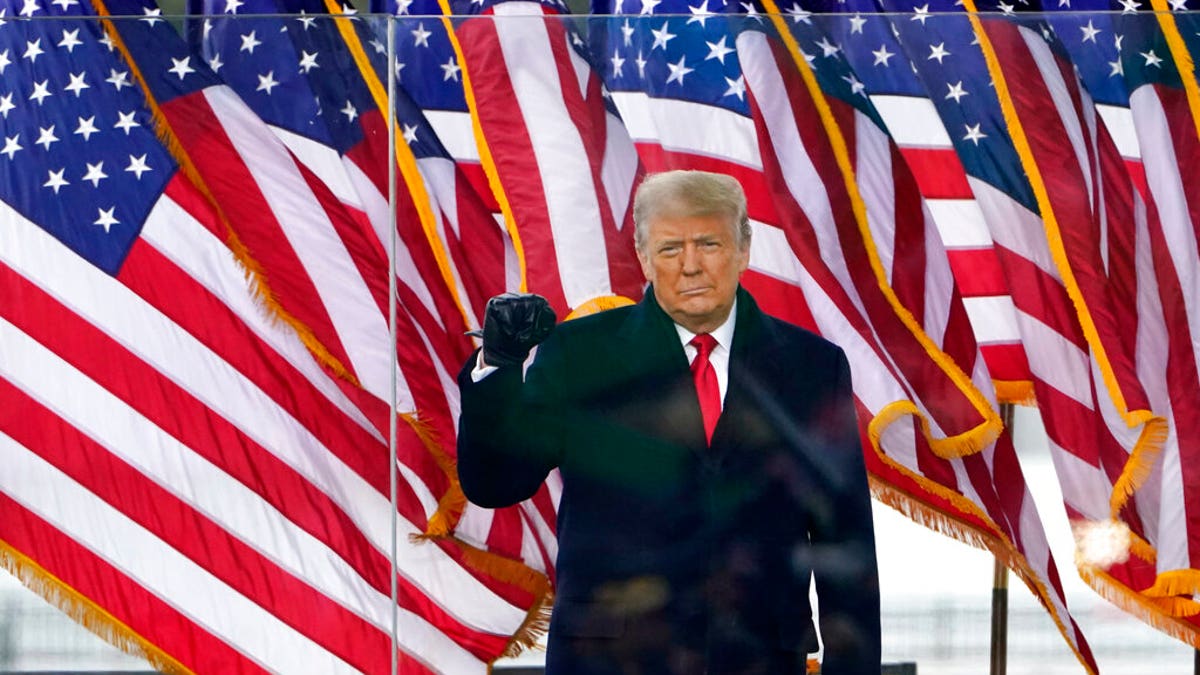
President Donald Trump arrives to speak at a rally Wednesday, Jan. 6, 2021, in Washington. (AP Photo/Jacquelyn Martin)
Meanwhile, Sen. Lisa Murkowski, R-Alaska, said of the Trump legal team's case: "I don't think it was very persuasive."
"I thought I knew where he was going, and I really didn't know where he was going," Sen Lindsey Graham, R-S.C., said of Trump attorney Bruce Castor.
"I'm puzzled by the presentation by the first attorney," Sen. Susan Collins, R-Maine, said of Castor.
"I thought the president's lawyer the first lawyer just rambled on and on and on and didn't really address the constitutional argument," added Sen. John Cornyn, R-Texas.
Trump himself was reportedly "furious" and "beyond angry" with his lawyers' performance Tuesday, sources tell Fox News.
"I'm sorry he felt that way -- have to do better next time," Trump lawyer David Schoen said in response to Cassidy's criticisms of the Trump legal team.
The former president was impeached on Jan. 13, just one week after a pro-Trump mob overtook the Capitol as Congress and former Vice President Mike Pence were certifying the results of President Biden's win in the 2020 election.
TRUMP 'BEYOND ANGRY' WITH IMPEACHMENT DEFENSE TEAM'S SHOWING: SOURCES
Democrats in Congress, and even some Republicans, were outraged that the former president had gathered a rally in Washington, D.C., that day where he repeated his false claims that he won the presidential election and said he did not do enough to stop the attack once his supporters began to breach the Capitol about one hour after his rally's conclusion.
But Trump's defenders say he is not responsible for the actions of the criminals that menaced lawmakers and attacked police, and note that later in the day he told his supporters in a Twitter video to go home.
As the arguments on the merits of the impeachment begin, Trump's lawyers are expected to say that Trump's words did not equate to incitement and that those who breached the Capitol are the ones fundamentally responsible for their own actions. Meanwhile, the House impeachment managers are expected to argue that Trump's false claims that the election was stolen were at the base of the mob's motivation, so therefore he is the one responsible for the attack on the Capitol.
Here's what you need to know about Trump's impeachment trial.
What's Trump accused of?
Incitement of insurrection is the fundamental charge behind the impeachment article. But that assertion is backed up by the impeachment managers with a litany of other charges about what actions from Trump incited the insurrection and why.
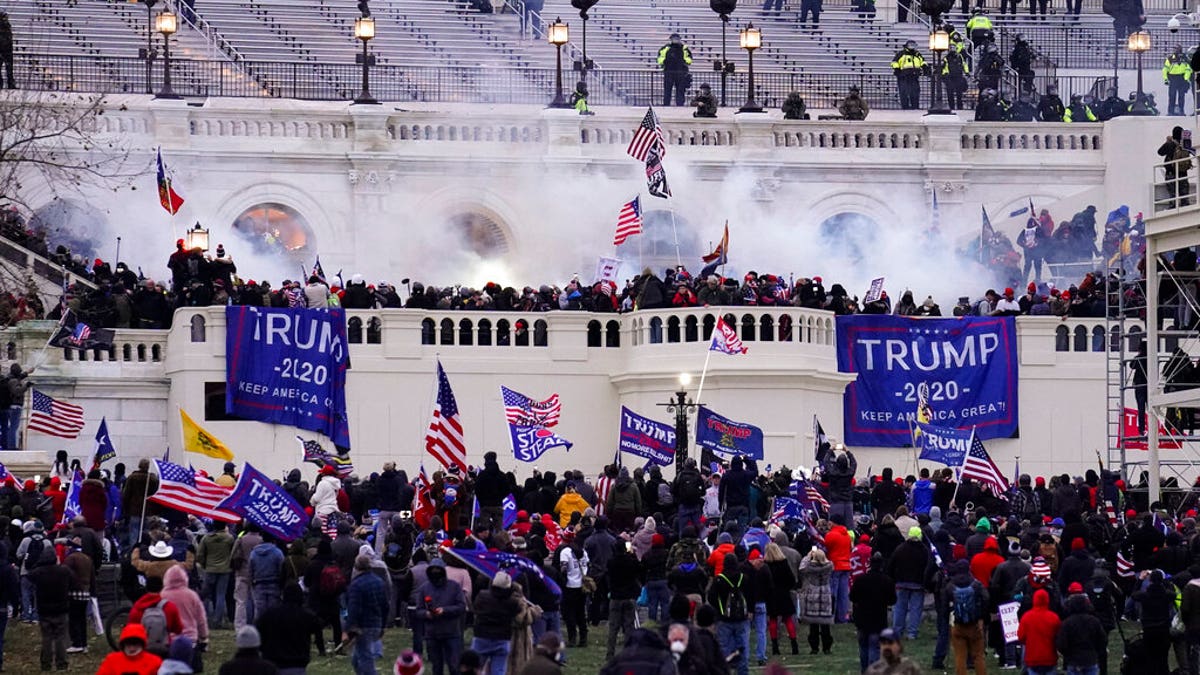
In this Jan. 6, 2021, file photo, violent rioters, loyal to President Donald Trump, storm the Capitol in Washington. (AP Photo/John Minchillo, File)
Those include that Trump lied about the results of the presidential election; that he tried to subvert the accurate and fair result of the election; and that he sent the mob of his supporters to the Capitol.
"He also willfully made statements that, in context, encouraged – and foreseeably resulted in – lawless action at the Capitol, such as: 'if you don’t fight like hell you’re not going to have a country anymore,'" the impeachment article says of the Jan. 6 "Save America Rally" Trump organized.
"Thus incited by President Trump, members of the crowd he had addressed ... unlawfully breached and vandalized the Capitol, injured and killed law enforcement personnel, menaced members of Congress, the vice president, and congressional personnel, and engaged in other violent, deadly, destructive and seditious acts," it continues. The article says the mob aimed to "interfere with the joint session’s solemn constitutional duty to certify the results of the 2020 presidential election."
Trump's defense team argues the impeachment article is improperly written and should have been split into several articles. The impeachment managers say the individual actions are all part of one "course of impeachable conduct."
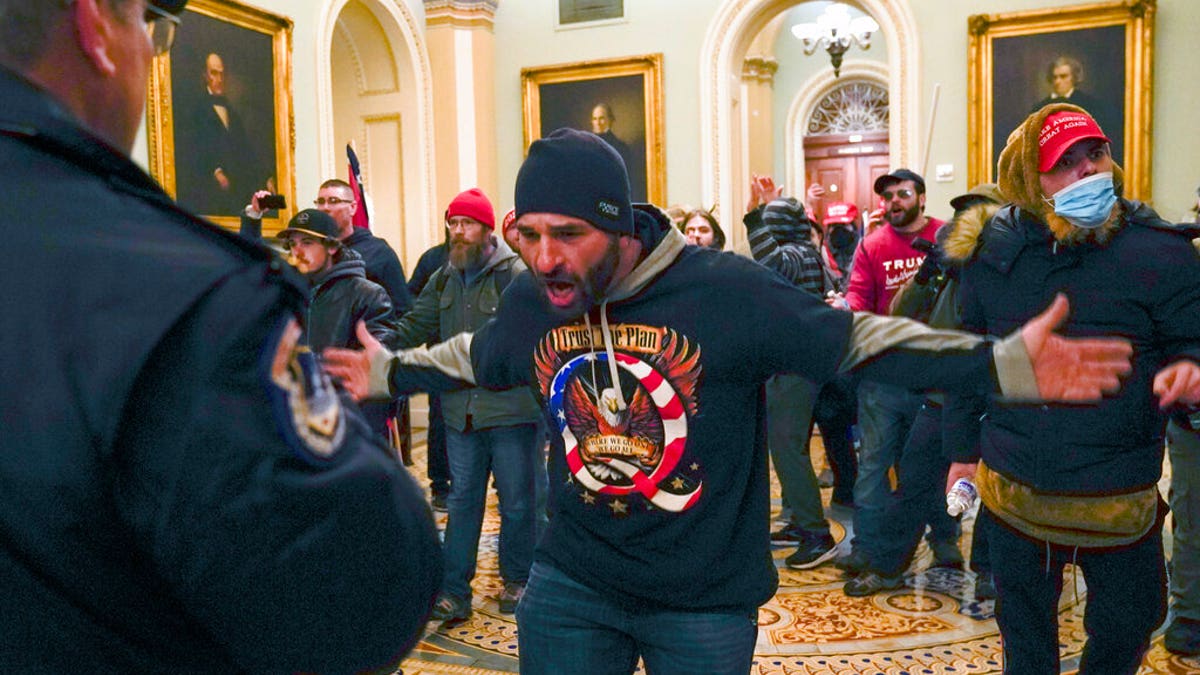
In this Jan. 6, 2021, file photo, Trump supporters gesture to U.S. Capitol Police in the hallway outside of the Senate chamber at the Capitol in Washington. Doug Jensen, an Iowa man at center, was jailed early Saturday, Jan. 9, 2021, on federal charges, including trespassing and disorderly conduct counts, for his alleged role in the Capitol riot. (AP Photo/Manuel Balce Ceneta, File)
Read more about the accusations against Trump and his team's answer to those charges HERE.
How does it work?
The trial gaveled in at 1 p.m. on Tuesday with Vermont Democrat Sen. Patrick Leahy, the chamber's president pro tempore, presiding in place of Chief Justice John Roberts. The chief justice is constitutionally required to oversee impeachments of presidents, but Roberts chose not to in this case as Trump is no longer commander-in-chief.
Vice President Harris also could have potentially presided over the trial, although senators have historically presided over impeachment proceedings when the person being tried is not the sitting president. The person overseeing the trial is not expected to substantially affect the outcome.
WHO IS SENATE PRO TEMPORE PATRICK LEAHY AND WHY IS HE PRESIDING OVER TRUMP IMPEACHMENT TRIAL?
Tuesday saw four hours of debate total, divided between the House impeachment managers and Trump's counsel about whether the impeachment trial is constitutional. The Senate voted 56-44 that the trial can move ahead, with Cassidy switching his vote from last month, when Sen. Rand Paul, R-Ky., forced a vote on a point of order alleging the trial is constitutional.
The sides will then have until 9 a.m. Wednesday to file any motions, and 11 a.m. Wednesday to file responses to those motions, before the arguments on the merits of the impeachment begin at noon Wednesday. The House will present its case first, and it will be allowed up to 16 total hours of argument over the course of two days.
Then Trump's lawyers will present their case, also up to 16 hours over two days.
Per an agreement between the two sides in the Senate and both parties, the trial will continue through the weekend on both Saturday and Sunday, even though impeachment trials typically take Sundays off.
This followed a request from Schoen to have the trial pause on Saturday for the Jewish Sabbath, which was granted but he later withdrew, citing other defense team members' ability to work that day.
CAN THE SENATE STOP TRUMP RUNNING FOR PRESIDENT AGAIN?
After the opening arguments, senators will have four total hours to question the lawyers for each side, then there will be two hours of arguments per party on whether the Senate should bring in any witnesses, which will be followed by a simple majority vote.
If the senators do not hear witnesses, it is likely the trial would wrap up by some time next week. If senators do vote to hear witnesses, then that will open up the possibility that the trial could drag on for much longer than anticipated.
Both sides would be allowed depositions and "discovery." The Senate would then decide which witnesses to hear testimony from. No witnesses can testify until they are first deposed, which would likely happen outside of the Senate floor.
The Senate will also take a vote as to whether it should consider evidence.
After the evidence and witnesses process, there will be two hours for each party to present closing arguments. Then there will be a vote on whether to convict the former president, which would require a two-thirds supermajority. If Trump is convicted, which is not expected to happen, there would be a subsequent simple-majority vote on whether to bar him from office in the future.
Who are the impeachment managers?
Rep. Jamie Raskin, D-Md., leads a team of House impeachment managers that also includes Reps. Diana DeGette, D-Colo.; David Cicilline, D-R.I.; Joaquin Castro, D-Texas; Eric Swalwell, D-Calif.; Ted Lieu, D-Calif.; Joe Neguse, D-Colo.; Madeleine Dean, D-Pa.; and nonvoting Delegate Stacey Plaskett of the Virgin Islands.
Raskin is a member of the House Oversight Committee, the House Rules Committee and the House Judiciary Committee.
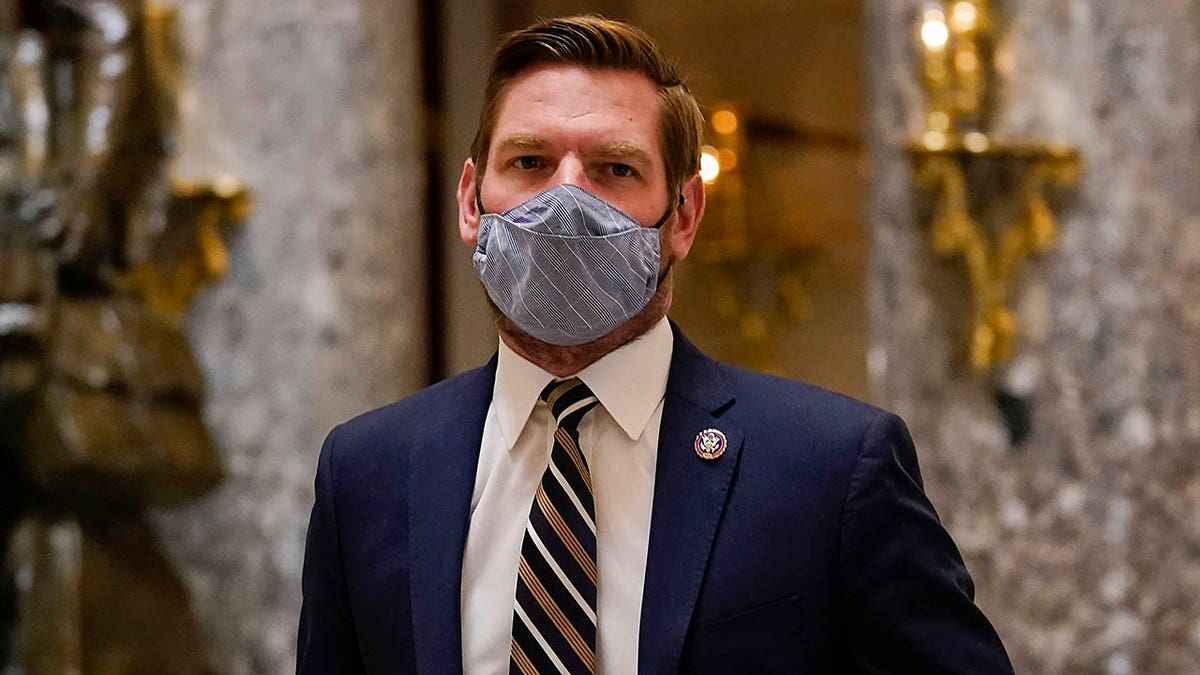
Impeachment manager Rep. Eric Swalwell, D-Calif., walks on Capitol Hill in Washington, Wednesday, Jan. 13, 2021. (AP Photo/Susan Walsh)
He penned a letter to Trump’s legal team this week urging him to testify before, or as part of, his Senate trial. Trump’s legal team denied the request, saying they would not take part in an "unconstitutional" process.
Swalwell, meanwhile, has run into controversy recently over his past relationship with a Chinese spy.
TRUMP LAWYERS RAIL AGAINST IMPEACHMENT TRIAL AS 'POLITICAL THEATER' ON EVE OF PROCEEDINGS
Learn more about the impeachment managers prosecuting the case against Trump HERE.
Who is on Trumps' defense team?
The two lead lawyers on Trump's defense team are Bruce Castor, the former district attorney for Montgomery County, Pa., and David Schoen, a longtime civil rights attorney who is the chairman of the American Bar Association's (ABA) Criminal Justice Subcommittee. Schoen was also honored for his pro bono work in 1995 by the ABA and was honored for public interest litigation in 2018 by Boston College Law School, his alma mater.
Schoen has ties to former Trump associate Roger Stone, who he represented as he was sentenced to 40 months in prison for witness tampering and other charges in early 2020. And he was one of the final people to meet with Jeffrey Epstein before his death.
Schoen said that Epstein planned to bring him onto his legal team and that he does not believe Epstein killed himself.
"I saw him a few days earlier," said Schoen on Fox Nation's "Deep Dive" last year. "The reason I say I don't believe it was suicide is for my interaction with him that day. The purpose of asking me to come there that day and over the past previous couple of weeks was to ask me to take over his defense."
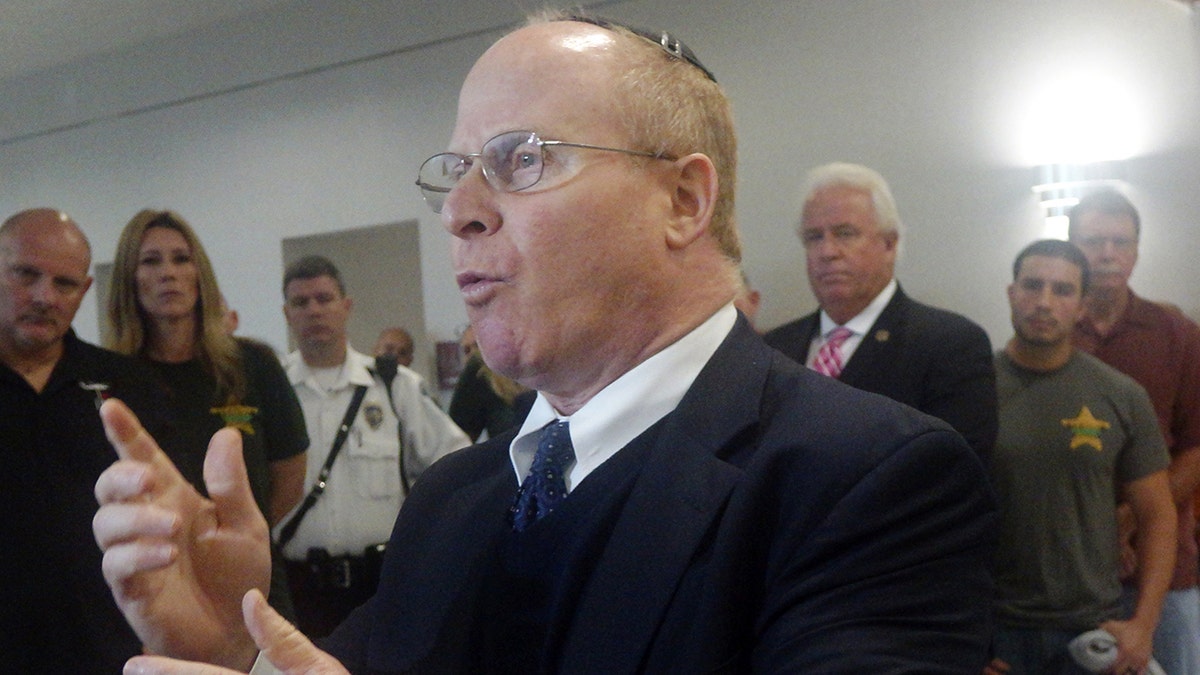
Attorney David Schoen speaks to the media, Wednesday, Jan. 6, Schoen is a civil rights lawyer who is on former President Trump's legal team for his impeachment trial. (Joe Cavaretta/South Florida Sun-Sentinel via AP) MAGS OUT (AP)
Castor, according to NBC Philadelphia, recently joined the personal injury firm van der Veen, O'Neill, Hartshorn, and Levin, and joined Trump's team after getting the permission of the firm's founding partner, Michael T. van der Veen.
DEM SENATOR CHRIS MURPHY ON TRUMP TRIAL: NOT 'RIDICULOUS' FOR GOP TO ARGUE IT'S UNCONSTITUTIONAL
Van der Veen then joined the Trump legal team as well, signing on to the Trump pretrial brief submitted Monday. He will play a presenting role this week.
Learn more about Schoen HERE.
Learn more about Castor HERE.
Learn more about van der Veen HERE.
Is the impeachment trial constitutional?
It depends on who you ask.
Republicans tend to say that the trial is unconstitutional, citing the fact that Trump is now out of office and that impeachment trials for presidents need the chief justice of the United States to preside -- and Chief Justice John Roberts is not there.
Democrats say the trial is constitutional, citing the 1876 trial of former Secretary of War William Belknap, which occurred after he left office. Belknap was acquitted. They also say that a trial is constitutional because there is still a consequence the Senate can level even if it can no longer remove Trump from office -- a ban on holding office in the future.
Either way, most scholars, regardless of their opinion, say whether the trial is constitutional is still an open question, as there's never before been a trial of a former president, and no court has ruled on the issue.
"I admit this is, of course, a matter of first impression and so I don't think the case that Sen. Paul is making is a ridiculous one," Sen. Chris Murphy, D-Conn., said on "Fox News Sunday" of Kentucky GOP Sen. Rand Paul's argument that the trial is unconstitutional.
And even if Trump's defense team asked the federal courts for a ruling on this issue, it's extraordinarily unlikely any court would step in to tell the Senate how to run its business. So the decision of whether the trial is constitutional is basically up to senators -- and they said it is on Tuesday, by a 56-44 vote.
What are the chances Trump is convicted?
Extraordinarily slim.
Paul's point of order in the Senate claiming that an impeachment trial of a former president is unconstitutional failed 45-55.
That means the trial was upheld as constitutional, but it also means 12 Republicans would have to change their minds about whether the trial is even allowed to happen for the Senate to have any shot of convicting Trump. Cassidy's vote Tuesday that the trial is constitutional moves Democrats marginally closer to their goal, but they still have a long way to go.
Besides that, there are political calculations at play. A vote to convict Trump is essentially an invitation for a Trump-backed primary challenge for any Republican. And the general perception within the GOP is that even if Republican elected officials have a distaste for Trump -- as shown by Wyoming GOP Rep. Liz Cheney's resounding victory in a vote of confidence under secret ballot last week -- that the party base is still loyal to the former president.
Going on the record against Trump is a massive political risk for any Republican.
CLICK HERE TO GET THE FOX NEWS APP
What happens if Trump is convicted?
However unlikely a conviction is at this point, it could still carry some consequences for the former president.
Though the main point of impeachment is to remove a person from office if convicted, a person can also be barred from holding office in the future. If Democrats do get the 67 votes they need to convict Trump of inciting an insurrection, then they plan to hold a subsequent vote on barring Trump from office in the future. That would only need a simple majority to pass.
If this does happen, Trump could theoretically challenge the constitutionality of the Senate trial in court in the future, aiming to get back his right to run for office. An after-the-fact challenge to the consequences of conviction is likely the only way a court would weigh in on this impeachment.
Fox News' Brooke Singman, Kristen Fisher Jason Donner, Chad Pergram and Ronn Blitzer contributed to this report.
























